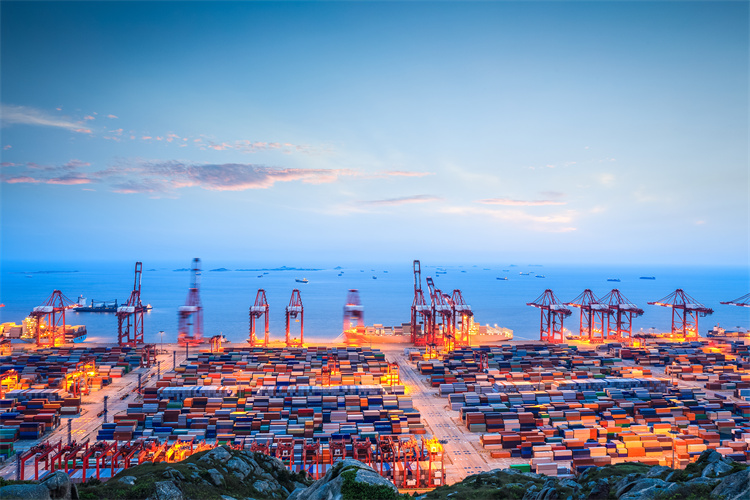The Economic Role of China-Europe Railways

The China-Europe Railway Express Route has redefined global trade by offering a faster and more cost-effective alternative to traditional transport modes. Spanning over 11,000 kilometers, it connects major cities in China with key destinations in Europe, reducing transit times to just 12-18 days compared to the 30-40 days required by sea. This rail network has witnessed exponential growth, with annual freight train trips surging from 1,702 in 2016 to over 17,000 by 2024. By integrating inland regions into global supply chains, it fosters economic integration and enhances trade efficiency across continents.
Key Takeaways
The China-Europe Railway Express significantly reduces transit times, taking only 12-18 days compared to 30-40 days by sea, enhancing trade efficiency.
This rail network has grown exponentially, with freight trips increasing from 1,702 in 2016 to over 17,000 by 2024, showcasing its rising importance in global logistics.
Rail transport offers a cost-effective alternative to air freight, balancing speed and affordability, making it ideal for businesses needing timely deliveries.
The railway supports environmental sustainability by producing lower carbon emissions compared to air and sea transport, aligning with green trade practices.
By connecting inland regions to major trade hubs, the railway opens new opportunities for SMEs, fostering economic growth and inclusivity in global trade.
The development of logistics hubs along the railway route enhances regional economies, creating jobs and streamlining the flow of goods across borders.
Innovations in smart logistics and technology along the railway are setting new standards for efficiency and reliability in the transportation industry.
The Development and Strategic Importance of the China-Europe Railway Express Route

Historical Growth and Expansion
Origins and milestones of the China-Europe Railway Express
The origins of the China-Europe Railway Express trace back to the early 2010s, when the first freight train journeyed from Chongqing, China, to Duisburg, Germany. This marked the beginning of a transformative era in global trade. The initiative emerged as part of China's broader efforts to enhance connectivity under the Belt and Road Initiative. Over the years, the railway has achieved remarkable milestones. By 2022, it connected over 223 cities in Europe and more than 100 in Asia, creating an extensive logistics network that spans continents.
The annual number of freight train trips has grown exponentially. In 2016, only 1,702 trips were recorded. By 2024, this figure exceeded 17,000 trips annually, reflecting the increasing reliance on rail transport for trade. The railway's ability to transport goods efficiently has made it a cornerstone of economic exchanges between China and Europe. Its development has not only facilitated trade but also integrated inland regions into global supply chains, boosting their economic potential.
Expansion of the China-Europe railway express route and its global significance
The expansion of the China-Europe Railway Express has reshaped the logistics landscape across Eurasia. The network now covers over 30 countries, connecting key trade hubs and enabling seamless movement of goods. Infrastructure developments have played a crucial role in this growth. For instance, the west route experienced a 13% rise in trips, while the middle route observed a 20% increase. The south route, in particular, saw a remarkable 15-fold growth in trips, highlighting its strategic importance.
This expansion has had a profound impact on global trade. By 2023, the railway transported goods valued at $56.7 billion, underscoring its economic significance. The network's ability to reduce transit times and costs has made it a preferred choice for businesses seeking efficient freight solutions. Moreover, the railway complements other modes of transport, such as maritime and air, offering diversified trade routes that enhance resilience in supply chains.
Strategic Role in Global Trade
Connecting China and Europe through efficient rail freight
The China-Europe Railway Express serves as a vital link between two of the world's largest economies. It provides a faster and more reliable alternative to traditional maritime transport. The average transit time for freight trains is approximately 12-18 days, significantly shorter than the 30-40 days required by sea. This efficiency has made the railway an attractive option for businesses exporting goods between China and Europe.
The railway's ability to handle diverse types of cargo, including electronics, automotive parts, and consumer goods, further enhances its appeal. By connecting inland cities in China to major European trade hubs, the railway has opened new opportunities for regions previously excluded from global trade networks. This connectivity has strengthened economic ties between the two regions, fostering mutual growth and collaboration.
Complementing maritime and air transport for diversified trade routes
The China-Europe Railway Express does not replace maritime or air transport but complements them by offering a middle ground in terms of speed and cost. While air transport is faster, it is significantly more expensive. Maritime transport, on the other hand, is cost-effective but slower. The railway strikes a balance, providing a cost-efficient solution with reduced transit times.
This diversification of trade routes enhances the resilience of global supply chains. Businesses can now choose the most suitable mode of transport based on their specific needs, ensuring flexibility and reliability. The railway's role in complementing other transport modes has made it an integral part of global trade, supporting the seamless movement of goods across continents.
Economic Benefits of the China-Europe Railway Express
Enhanced Trade Efficiency
Reduced transit times compared to maritime transport
The China-Europe Railway Express has revolutionized the logistics landscape by significantly reducing transit times. Freight transported via rail takes approximately 12-18 days to travel between China and Europe, compared to the 30-40 days required for maritime shipping. This time-saving advantage allows businesses to respond more quickly to market demands and seasonal fluctuations. The shorter transit time also ensures that perishable goods and high-demand products reach their destinations faster, enhancing the overall efficiency of global trade.
Cost-effectiveness for businesses in China and Europe
The railway offers a cost-effective solution for businesses seeking alternatives to air and sea freight. Rail transport costs only a fraction of air freight, making it an attractive option for companies aiming to optimize their logistics budgets. While slightly more expensive than sea transport, rail freight provides a balance between cost and speed, making it ideal for industries requiring timely delivery without incurring the high expenses of air transport. This cost-efficiency has encouraged businesses in both China and Europe to adopt rail as a preferred mode of transport, further boosting the development of foreign trade.
Environmental Sustainability
Lower carbon emissions compared to air and sea freight
Rail transport stands out as an environmentally friendly alternative to traditional modes of freight transportation. It produces significantly lower carbon emissions compared to air and sea freight. For instance, rail freight reduces carbon emissions by approximately 30% compared to air transport. This makes it a sustainable choice for businesses committed to reducing their environmental footprint. By choosing rail, companies contribute to global efforts to combat climate change while maintaining efficient trade operations.
Contribution to green trade practices
The adoption of rail freight aligns with the growing emphasis on green trade practices. The China-Europe Railway Express supports the shift toward sustainable logistics by offering a cleaner mode of transportation. Its ability to transport large volumes of goods with minimal environmental impact has positioned it as a key player in promoting eco-friendly trade. This commitment to sustainability not only benefits the environment but also enhances the reputation of businesses that prioritize green practices in their supply chains.
Trade Facilitation and Accessibility
Increased trade volumes between China and Europe
The China-Europe Railway Express has played a pivotal role in increasing trade volumes between the two regions.
Improved access for SMEs and inland regions
The railway has enhanced connectivity for small and medium-sized enterprises (SMEs) and inland regions in both China and Europe. By linking inland cities to major trade hubs, it has opened new opportunities for businesses previously excluded from global trade networks. SMEs, in particular, benefit from the cost-effective and reliable nature of rail freight, enabling them to compete in international markets. Additionally, the railway has spurred economic development in landlocked regions, transforming them into vital nodes in the global trade ecosystem.
Broader Economic Impact of the China-Europe Railway Express
Regional Development and Economic Growth
Development of logistics hubs along the China-Europe railway express route
The China-Europe Railway Express has catalyzed the establishment of logistics hubs along its extensive route. These hubs serve as critical nodes for managing the flow of goods, ensuring seamless operations across borders. Cities such as Duisburg in Germany and Chongqing in China have emerged as prominent logistics centers, benefiting from increased trade activity. These hubs not only streamline freight handling but also create employment opportunities, driving local economic growth.
The development of these hubs has enhanced the efficiency of supply chains, reducing transit times and improving the reliability of freight services. By integrating advanced technologies, such as automated sorting systems and real-time tracking, these hubs contribute to the modernization of global logistics networks. This infrastructure investment underscores the railway's role in fostering regional development and strengthening the connectivity between China and Europe.
Economic opportunities for landlocked regions in China and Europe
The China-Europe Railway Express has transformed the economic landscape of landlocked regions. Previously isolated areas now enjoy direct access to international markets, enabling them to participate in the development of foreign trade. For instance, inland cities in China, such as Zhengzhou and Xi’an, have become vital trade gateways. Similarly, regions in Central and Eastern Europe have experienced a surge in economic activity due to their strategic location along the railway route.
This newfound accessibility has spurred industrial growth, attracting investments in manufacturing and logistics. Businesses in these regions benefit from reduced transit times and lower transportation costs, enhancing their competitiveness in the market. The railway's ability to connect these areas to global trade networks has unlocked their economic potential, fostering inclusive growth across continents.
Changes in Trade Structures
Diversification of trade routes and partners
The China-Europe Railway Express has diversified trade routes, reducing reliance on traditional maritime and air transport. This diversification enhances the resilience of global supply chains, providing businesses with alternative options for transporting goods. The railway's extensive network, spanning over 30 countries, facilitates the exchange of goods between a wide range of trade partners.
This shift has encouraged the development of foreign trade, enabling businesses to explore new markets and establish partnerships across Eurasia. The railway's ability to handle diverse cargo types, from electronics to automotive parts, further supports this diversification. By offering a reliable and cost-effective solution, the railway has reshaped trade structures, promoting balanced economic growth.
Shift in trade dynamics between China and Europe
The China-Europe Railway Express has redefined trade dynamics between the two regions. By providing a faster and more efficient alternative to maritime transport, the railway has strengthened economic ties between China and Europe. The belt and road initiative has played a pivotal role in this transformation, fostering collaboration and mutual growth.
The railway's impact extends beyond transportation. It has facilitated the exchange of technology, expertise, and investments, creating a more interconnected economic ecosystem. This shift has positioned the railway as a cornerstone of global trade, driving innovation and competitiveness in both regions.
Innovation in Logistics and Technology
Advancements in smart logistics systems
The China-Europe Railway Express has driven significant advancements in smart logistics systems. Technologies such as IoT, big data, and cloud computing have been integrated into the railway's operations, enhancing efficiency and transparency. Real-time tracking systems enable businesses to monitor shipments, ensuring timely delivery and reducing operational risks.
These innovations have improved the overall reliability of rail freight, making it a preferred choice for businesses. By leveraging smart logistics, the railway has set new standards for efficiency and sustainability in the transportation industry. This technological progress highlights the railway's role in shaping the future of global logistics.
Role in driving rail freight technology innovation
The railway has also spurred innovation in rail freight technology. Investments in high-speed trains, automated systems, and energy-efficient solutions have enhanced the railway's performance. These advancements have reduced transportation costs and minimized environmental impact, aligning with global sustainability goals.
The collaboration between Chinese and European stakeholders has further accelerated technological progress. Joint research and development initiatives have resulted in cutting-edge solutions, benefiting the entire logistics industry. The railway's commitment to innovation underscores its importance as a driver of economic growth and technological advancement.
Case Study: The Yiwu-Madrid Route and Its Economic Impact

Overview of the Yiwu-Madrid Connection
Key milestones and trade statistics
The Yiwu-Madrid rail link, launched in November 2014, represents a significant milestone in the evolution of China-Europe rail freight. Stretching over 13,052 kilometers, it holds the distinction of being the longest rail transport service in the world. This route connects Yiwu, a major hub for small commodities in China, to Madrid, a key European trade center. The journey spans eight countries across Eurasia, creating a vital corridor for the movement of goods.
The rail service offers a transit time of approximately 16 to 18 days, which is significantly faster than the traditional maritime route. It can transport up to 30,560 cubic meters of goods, with a weight capacity exceeding 1,000 tons. These capabilities make it an efficient and reliable option for businesses seeking to optimize their logistics operations. By 2023, the Yiwu-Madrid route had become a preferred choice for value-added cargo, complementing maritime and air transport.
Importance for trade between China and Spain
The Yiwu-Madrid rail line has emerged as a cornerstone of trade between China and Spain. It facilitates the export of Spanish wines, olive oil, and other high-value goods to China, ensuring quicker delivery and fresher products for consumers. In return, it enables the import of Chinese electronics, textiles, and consumer goods into Spain. This exchange strengthens economic ties between the two nations and fosters mutual growth.
The route's efficiency has also contributed to the development of foreign trade by reducing transit times and costs. Businesses in both regions benefit from improved access to international markets, enhancing their competitiveness in the global trade ecosystem. The Yiwu-Madrid connection exemplifies the transformative potential of China-Europe rail freight in driving economic collaboration.
Broader Implications of the Yiwu-Madrid Route
Boost to local economies along the route
The Yiwu-Madrid rail line has significantly impacted local economies along its path. Cities such as Duisburg in Germany and Lodz in Poland have developed into critical logistics hubs, benefiting from increased trade activity. These hubs streamline the handling of goods, creating employment opportunities and driving regional economic growth.
The route also supports the economic development of smaller towns and cities situated along the railway. By integrating these areas into global trade networks, it unlocks their potential for industrial growth and investment. The Yiwu-Madrid connection demonstrates how rail infrastructure can catalyze regional development and foster inclusive economic progress.
Increased trade in consumer and industrial goods
The Yiwu-Madrid rail link has facilitated a surge in the trade of both consumer and industrial goods. Its ability to transport diverse cargo types, including electronics, automotive parts, and perishable items, makes it a versatile option for businesses. The shorter transit time ensures that high-demand products reach their destinations promptly, meeting market needs effectively.
This increase in trade volumes has strengthened the supply chains of industries in both China and Europe. The route's reliability and efficiency have encouraged businesses to adopt rail as a primary mode of transport, further boosting the development of foreign trade. The Yiwu-Madrid connection highlights the pivotal role of China-Europe rail freight in enhancing global trade dynamics.
JUSDA’s Role in Supporting the China-Europe Railway Express
JUSDA’s Rail Transport Solutions
Leveraging the China-Europe railway express route for efficient logistics
By leveraging this extensive rail network, JUSDA ensures seamless transportation of goods across continents. The company’s expertise in cross-border logistics enables businesses to enhancing the efficiency of their supply chains, reducing transit times and improving reliability.
The company’s rail transport services integrate advanced planning and execution strategies. These strategies ensure that goods are transported securely and efficiently, meeting the demands of modern trade. JUSDA’s ability to handle various cargo types, including electronics, automotive parts, and consumer goods, makes it a preferred partner for businesses seeking reliable logistics solutions. By utilizing the China-Europe Railway Express, JUSDA contributes to bilateral trade facilitation and strengthens economic cooperation between the two regions.
Integration of JusLink intelligent supply chain for enhanced trade facilitation
JUSDA’s innovative JusLink intelligent supply chain platform plays a pivotal role in enhancing logistics efficiency along the China-Europe Railway Express. This platform integrates cutting-edge technologies such as AI, IoT, and big data to streamline operations and foster real-time collaboration among suppliers, manufacturers, and customers. By providing end-to-end visibility, JusLink ensures that businesses can monitor shipments, anticipate delays, and make informed decisions.
The platform’s ability to analyze vast amounts of data enhances the predictability and reliability of rail freight. It optimizes routes, reduces operational risks, and minimizes costs, making it an indispensable tool for businesses engaged in economic and trade cooperation. Through JusLink, JUSDA not only facilitates the movement of goods but also supports the broader goal of sustainable and efficient global trade.
Industry-Specific Supply Chain Services
Tailored solutions for electronics, FMCG, and automotive industries
JUSDA offers industry-specific supply chain services that cater to the unique needs of sectors such as electronics, FMCG, and automotive. For the electronics industry, JUSDA ensures the safe and timely delivery of high-value and sensitive components. Its rail transport solutions provide a cost-effective alternative to air freight while maintaining shorter transit times compared to maritime shipping.
In the FMCG sector, JUSDA’s expertise in handling perishable and high-demand goods ensures that products reach their destinations quickly and in optimal condition. The company’s ability to manage large volumes of goods efficiently supports the fast-paced nature of this industry. For the automotive sector, JUSDA provides specialized logistics solutions that accommodate the transportation of heavy and complex components, ensuring seamless integration into production lines.
These tailored services highlight JUSDA’s commitment to addressing the specific challenges of each industry. By leveraging the China-Europe Railway Express, JUSDA enhances the competitiveness of businesses in these sectors, fostering economic cooperation and growth.
Supporting SMEs and large-scale manufacturers in China and Europe
JUSDA plays a crucial role in supporting both SMEs and large-scale manufacturers in China and Europe. For SMEs, the company provides cost-effective rail transport solutions that enable them to compete in international markets. By offering reliable and efficient logistics services, JUSDA helps smaller businesses overcome barriers to global trade, such as high transportation costs and limited access to trade networks.
Large-scale manufacturers benefit from JUSDA’s ability to handle complex supply chain requirements. The company’s extensive experience in managing high-volume shipments ensures that manufacturers can meet production schedules and market demands. By connecting inland regions in China to major trade hubs in Europe, JUSDA facilitates economic cooperation and drives regional development.
Through its comprehensive range of services, JUSDA strengthens the economic ties between China and Europe. Its contributions to logistics efficiency and bilateral trade facilitation underscore its importance as a partner in the global trade ecosystem.

JUSDA Solutions
To provide you with professional solutions and quotations.
The China-Europe Railway Express Route has redefined the logistics landscape, bridging China and Europe with faster, cost-effective, and sustainable solutions. Its transformative role extends beyond transportation, driving regional development and reshaping trade patterns. By reducing transit times and enhancing connectivity, it strengthens bilateral trade and fosters foreign trade development. The impact of China-Europe freight trains on global trade highlights their importance in modern supply chains. With strategic partnerships and innovations, the railway will continue to support market demands, boost exports, and shape the future of international commerce.
See Also
Exploring How Global Trade Policies Shape Economic Landscapes
Revolutionizing Supplier Connections in International E-commerce
Addressing Global Supply Chain Growth Obstacles Effectively
Enhancing Global E-commerce Through Supply Chain Transparency
